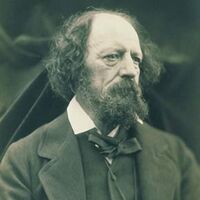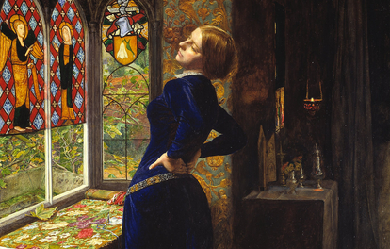Locksley Hall
"Locksley Hall" is a poem written by Alfred Tennyson in 1835 and published in his 1842 volume of Poems. Though one of his masterworks, it is less well-known than his other literature. It narrates the emotions of a weary soldier come to his childhood home, the fictional Locksley Hall.
According to Tennyson, the poem represents "young life, its good side, its deficiencies, and its yearnings”. Tennyson's son Hallam recalled that his father said the poem was inspired by Sir William Jones's prose translation of the Arabic Mu’allaqat.
Poetic form
"Locksley Hall" is a dramatic monologue written as a set of 97 rhyming couplets. Each line follows a modified version of trochaic octameter in which the last unstressed syllable has been eliminated; moreover, there is generally a caesura, whether explicit or implicit, after the first four trochees in the line. Each couplet is separated as its own stanza. The University of Toronto library identifies this form as "the old 'fifteener' line," quoting Tennyson, who claimed it was written in trochaics because the father of his friend Arthur Hallam suggested that the English liked the meter.
Plot summary
The unnamed protagonist is a soldier traveling with a small military unit. He asks his company to continue ahead as he pauses for sentimental reasons. He then quickly reveals that the place he has stopped at is called Locksley Hall, and he spent his childhood there. The rest of the poem, though written as rhymed metered verse, follows the stream of consciousness of its protagonist as an interior monologue. The protagonist struggles to reach some sort of catharsis on his childhood feelings.
In his monologue, the protagonist begins with fond memories of his childhood and love, but those memories quickly lead to a burst of anger because his lover abandoned him due to her parents' disapproval. He proceeds to offer a biting criticism of his lover's new husband, interspersed with personal reflection. This criticism is only really interrupted when he reflects that his lover will eventually have a child, and will be more concerned with her child than about the protagonist. The protagonist promptly continues his angry tirade, this time directed at the mother-child relationship.
The protagonist reveals frustration with his present career, which he identifies as an escape from a depression and sense of hopelessness, saying:
Every door is barr'd with gold, and opens but to golden keys.
Every gate is throng'd with suitors, all the markets overflow.
I have but an angry fancy; what is that which I should do?
I had been content to perish, falling on the foeman's ground,
When the ranks are roll'd in vapour, and the winds are laid with sound. (lines 99-104)
In order to be free of his depression, the protagonist continues into a grand description of the world to come—which he views as somewhat utopian. He relapses into anger briefly again when he hears a bugle call from his comrades telling him to hurry up.
Much of the remainder of the poem is built up of an odd contrast between the beauty of civilization and the beauty of the noble savage. He recalls the land where he was born (which he only says is somewhere in the Orient), and lovingly notes its lack of civilization, describing it as "Summer isles of Eden" and "knots of Paradise.”
In the end, he rejects the ideal of the noble savage, preferring the progress that civilization has made. He also immediately thereafter rejects Locksley Hall, and marches forth to meet his comrades.
The main character
Tennyson neither identifies the protagonist as a hero nor an anti-hero. The first half of the poem portrays him as a victim, but the second reveals that the protagonist holds views that are now recognized as remarkably racist and sexist; for example:
Nature made them blinder motions bounded in a shallower brain:
Woman is the lesser man, and all thy passions, match’d with mine,
Are as moonlight unto sunlight, and as water unto wine (lines 149-152)
The narrator is also remarkably emotionally volatile through the poem. A good example[3] occurs when he reminisces about his love for his cousin Amy; while recalling the wonderful experiences of love, he immediately becomes infuriated with her, even going so far as to throw insults:
And our spirits rush’d together at the touching of the lips.
O my cousin, shallow-hearted! O my Amy, mine no more!
O the dreary, dreary moorland! O the barren, barren shore! (lines 37-40)
His anger at losing his love penetrates the poem, and reaches tremendous proportions.
In the narrator, Tennyson captures and displays many strong emotions—placid insightfulness, wonder, love, jealousy, despair, and eventually a sort of catharsis. Tennyson also uses the narrator to speculate on what the world might become: he presents a vision of human advance and conflict, of aerial commerce and combat, resolving in a world of federation, peace, and universal law. As many of these predictions have since been realized, Tennyson's work now seems prescient in many ways.
Cultural influence
Though Alfred, Lord Tennyson is one of the most famous poets in English literature, "Locksley Hall" is one of his lesser-known works. This is not without exceptions, of course; the historian Arthur Schlesinger Jr., writing in the Wall Street Journal, quoted the poem to illustrate "a noble dream" that modern U.S. policy decisions may have been neglecting, and he also stated that Winston Churchill considered it "the most wonderful of modern prophecies" and Harry S. Truman carried the words in his wallet.
Lord Tennyson wrote a sequel to Locksley Hall in 1886, "Locksley Hall Sixty Years After". In the sequel Tennyson describes how the industrialised nature of Britain has failed to fulfil the expectations of the poem of 1842.
A line in "Locksley Hall" would inspire the title of the historian Paul Kennedy's 2006 book on the United Nations, The Parliament of Man: The Past, Present, and Future of the United Nations.
Locksley Hall was parodied, not without beauty, to the foxhunter at least, by the Victorian English foxhunting MP William Bromley Davenport (1821–1884) in his poem "Lowesby Hall", named after a famous hunting seat in Leicestershire, the pre-eminent fox-hunting county. It describes the revived emotion in a jaded and spend-thrift city MP as he recalls the excitement of his youth foxhunting in Leicestershire, and foresees the end of his Victorian aristocratic society:
Hide me from my deep emotion O thou wonderful champagne
Make me feel the wild pulsation I have often felt before
When my horse went on before me and my hack was at the door
later:
To the Cotton Lords to whom it's proved all property belongs
Queen Religion State abandoned and all flags of party furled
In the government of Cobden and the dotage of the world.
In a scene from the American film Marathon Man, graduate student Thomas "Babe" Levy (portrayed by actor Dustin Hoffman) attends an exclusive seminar at Columbia University. During the seminar, his irritable professor, played by Fritz Weaver, quotes the line "Let us hush this cry of ‘Forward’ till ten thousand years have gone" from "Locksley Hall Sixty Years After" and then asks if anyone recognizes it. Hoffman's character is the only one who does (he writes down the title in his notes) but does not reveal this to the class. The professor calls him out on this after dismissing the other students.
In the television programme Star Trek: Voyager, the dedication plaque of the U.S.S. Voyager quotes from the poem: "For I dipt in to the future, far as human eye could see; Saw the vision of the world, and all the wonder that would be.”
"Locksley Hall" is also the source of the title of Colum McCann's 2009 novel, Let the Great World Spin.
James Thurber illustrated this poem for Fables for Our Time and Famous Poems Illustrated.
References
Wikipedia - http://en.wikipedia.org/wiki/Locksley_Hall(1835)
#English #Victorians #Couplet 1842 in published



